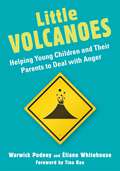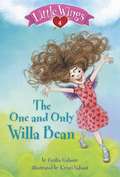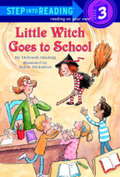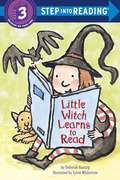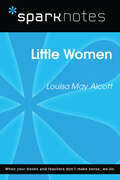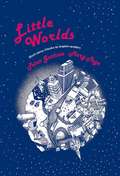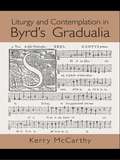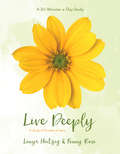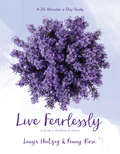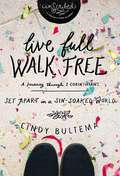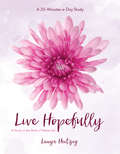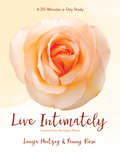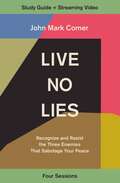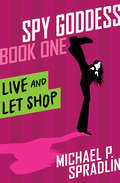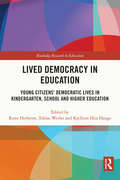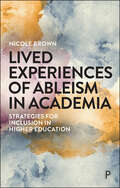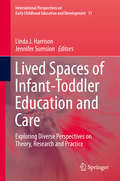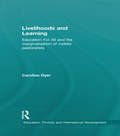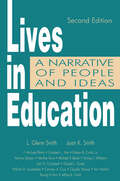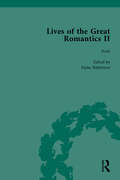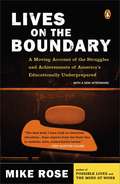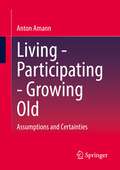- Table View
- List View
Little Volcanoes: Helping Young Children and Their Parents to Deal with Anger
by Tina Rae Éliane Whitehouse Warwick PudneyYoung children can erupt like little volcanoes when they are feeling angry. It can be overwhelming and difficult to deal with, and can produce angry feelings in the parent or caregiver too. This book is packed with advice and strategies for those working with children under five on how to understand and manage anger in children, and also how to help their parents or caregivers to deal with anger. The authors outline the different reasons children may feel angry so that their emotions can be fully understood, and offer strategies to combat negative feelings and minimize outbursts. These include putting in place behavioural boundaries and helping a child to feel secure. Simple activities and exercises are also given to help children and adults to express their anger positively. In addition, a selection of poems and stories will help adults to pass on the lessons of the book to children. This practical and accessible book will be of essential use to any professional helper of parents and young children such as early childhood educators, caregivers and social workers, as well as to parents themselves.
Little Wings #4: The One and Only Willa Bean (Little Wings #4)
by Cecilia Galante Kristi ValiantCecilia Galante's sweet series about a lovable curly-haired cupid soars on in book #4.Every cupid has a one-of-a-kind flying friend, right? Wrong! Willa Bean has Snooze, an owl, but the new girl in school, Lucy, has an owl, too! And Lucy's owl is bigger, and maybe even smarter, than Snooze. What if Mr. Wingston overshadows Snooze at Noble Nimbus Day? Nope, nope, nope-ity nope. Willa Bean has to make sure Snooze is the best owl at Cupid Academy!
Little Witch
by Anna Elizabeth BennettLittleWitch Nine-year-old Minx, a little witch, is forbidden to go to school or wash behind her ears. And she's not happy about it. One day she sneaks off to school. Suddenly life gets much more exciting for a lot of people-especially the students and the principal! "Full of humor. Fun to read aloud." -The Horn Book Magazine
Little Witch Goes to School (Step into Reading)
by Deborah HautzigLittle Witch goes to school for the first time and takes her classmates on a broomstick ride.
Little Witch Learns to Read
by Deborah HautzigLittle Witch's family is not at all helpful when she is learning to read, so she hides her books and reads by flashlight until late at night and becomes so sleepy that she cannot stay awake during the day.
Little Women (SparkNotes Literature Guide Series)
by SparkNotesLittle Women (SparkNotes Literature Guide) by Louisa May Alcott Making the reading experience fun! Created by Harvard students for students everywhere, SparkNotes is a new breed of study guide: smarter, better, faster. Geared to what today's students need to know, SparkNotes provides: *Chapter-by-chapter analysis *Explanations of key themes, motifs, and symbols *A review quiz and essay topicsLively and accessible, these guides are perfect for late-night studying and writing papers
Little Worlds: A Collection of Short Stories for the Middle School
by Peter Guthrie Mary PageExplore Little Worlds large collection of stories of high literary quality presenting students with a variety of issues, styles, conflicts, and points of view. Featured authors include Maupassant, Lessing, Hemingway, Welty, Hawthorne and Porter.
Liturgy and Contemplation in Byrd's Gradualia
by Kerry McCarthyWilliam Byrd’s Gradualia is one of the most unusual and elaborate musical works of the English Renaissance. <P><P> This large collection of liturgical music, 109 pieces in all, was written for clandestine use by English Catholics at a time when they were forbidden to practice their religion in public. When Byrd began to compose the Gradualia, he turned from the penitential and polemical extravagances of his earlier Latin motets to the narrow, carefully ordered world of the Counter-Reformation liturgy. It was in this new context, cut off from his familiar practice of choosing colorful texts and setting them at length, that he first wrote about the "hidden and mysterious power" of sacred words to evoke a creative response. <P><P> Liturgy and Contemplation in Byrd’s Gradualia responds to Byrd’s own testimony by exploring how he read the texts of the Mass and the events of the church calendar. Kerry McCarthy examines early modern English Catholic attitudes toward liturgical practice, meditation, and what the composer himself called "thinking over divine things." She draws on a wide range of contemporary sources — devotional treatises, commentaries on the Mass, poetry, memoirs, letters, and Byrd’s dedicatory prefaces — and revisits the Gradualia in light of this evidence. The book offers a case study of how one artist reimagined the creative process in the final decades of his life.
Live Brilliantly: A Study in the Book of 1 John
by Lenya HeitzigThis all-new Fresh Life Bible study takes readers through the book of 1 John, inspiring them to respond to God’s call to be light bearers in a dark world. Each 20-minute study of 1 John in Live Brilliantly reminds readers that when their lives reflect God’s light, no darkness can overtake them. When a Christian follows God’s Word, light shines on their decisions, relationships, and actions. Their words as they live out the gospel bring light to even the darkest places. This rich yet accessible Bible study ignites readers with a new passion for God, shutting out the darkness that threatens their spirits and the world—because God’s Word is light everlasting.
Live Deeply: A Study of the Parables of Jesus
by Lenya Heitzig Penny RoseEver read one of Jesus' parables and ask, "What is He talking about?" If so, you're not alone. Jesus' own disciples were also perplexed by the enigmatic stories Christ told.Now you—alone or with your small group—can dig deeper into the meaning of these parables to uncover their important meaning for your walk with Christ. Designed with today's busy woman in mind, each lesson can be completed in as little as 20 minutes per day, but leave you with a lifetime of valuable insights.Based on the inductive Bible study method, each lesson conjures vivid imagery of the sights and sounds of ancient Israel alongside poignant application questions for today. There's something here for Christians of all shapes and sizes. Everyone will leave with a more profound understanding of Christ's amazing parables.
Live Fearlessly: A Study in the Book of Joshua (Fresh Life Series #2)
by Lenya Heitzig Penny Pierce RoseDo you ever feel like you don’t have what it takes? Like you can’t be as good as those around you? Well, after waiting decades for his time to lead, Joshua had some big shoes to fill. He may have felt slightly intimidated by the task at hand. Joshua’s predecessor, Moses, had a near spotless résumé: he led the Jews out of Egypt, parted the Red Sea, and even conversed directly with God. Not exactly an easy act to follow. Yet Joshua’s fearless confidence in God proved to be more than enough. God used Joshua in miraculous ways. All his life, the people of Israel followed and trusted Joshua’s lead. The Fresh Life series was created by women for women, who crave a profound experience of God’s Word without an overwhelming time commitment. In just 20 minutes a day, you will come to a deeper understanding of the truths of the Bible. With a group or by yourself, use this easy-to-use study to develop a fearless, Joshua-like confidence in God so you can accomplish everything He asks you to do.
Live Full Walk Free Study Guide: Set Apart in a Sin-Soaked World (InScribed Collection)
by Cindy BultemaIn this six-session Bible study, Cindy Bultema explores Paul's first letter to the Corinthians and shows how believers today can navigate their way in a wayward and confused culture. She reveals how Paul wrote his letter to the Corinthians--the "Sin City" of its day--to help them cultivate holy lives not by their own strength but through the power of Jesus Christ. Touching on themes of identity, unity, purpose, and purity, this study will equip you to live for God in a sin-soaked world and handle each situation with grace. Session include: Introduction: Set Apart in a Sin-Soaked World Welcome to Sin City Cliques, Fools, & Secrets New Hearts, Old Habits Sex in the Sinful City To Eat or Not to Eat Our Final Victory Designed for use with the Live Full Walk Free DVD 9780310082170 (sold separately).
Live Hopefully: A Study in the Book of Nehemiah
by Lenya HeitzigThis all-new 20-minutes-a-day study of Nehemiah reminds readers that with God’s help, one person who is ready to do the impossible can change the world. Hope is not wishful thinking. It is a confident expectation for the future. Nehemiah knew how to live with true hope. After boldly requesting permission from the king to rebuild the walls of Jerusalem after the Babylonian exile, he restored the city and called his people back to God. Despite opposition on all sides, Nehemiah saw God transform a cup-bearer into a contractor, ruins into a city, and a wayward people into followers of God. As Bible teacher Lenya Heitzig reminds readers in this new Fresh Life study, God calls them to live boldly with a hope that only He can give.
Live Intimately: Lessons from the Upper Room
by Lenya Heitzig Penny Pierce RoseThis is it. After three years of ministry, traveling the countryside, encountering thousands of desperate people, delivering a radical new message, Jesus has one last night to spend with His disciples. And He knows it. What does Jesus say? How does He say it? What can we learn from his final words? Put yourself in the Upper Room, there with Jesus and his closest companions as he gave them his final instructions (John 13-17). Imagine what it would have been like to hear his voice, mere hours before his death, in this Fresh Life Bible study by authors Lenya Heitzig and Penny Pierce Rose. The Fresh Life series was created by women, for women, who crave a profound experience of God's Word without an overwhelming commitment of time. With each lesson, you will come to a deeper understanding of the truths of the Bible and develop a deeper intimacy with God.
Live No Lies Bible Study Guide plus Streaming Video: Recognize and Resist the Three Enemies That Sabotage Your Peace
by John Mark ComerThe problem isn't so much that we tell lies but that we live them. You are at war against lies. . .but you can defeat them.The Live No Lies Bible Study draws from biblical truth and the wisdom of past saints to help you see how each of our soul's enemies—the devil, the flesh, and the world—rob us of hope; sabotage our peace; and wreak havoc on our physical, emotional, and spiritual health.You'll learn how to unmask these lies and develop a strategy to fight back against deception by standing firmly on the truth we believe.This video study guide with bestselling author of The Ruthless Elimination of Hurry John Mark Comer has everything you need for a full Bible study experience, including:The study guide itself—with discussion and reflection questions, video notes, and a leader's guide.An individual access code to stream all four video sessions online (you don't need to buy a DVD!).Each session looks at specific ways lies infiltrate your life and how you can eradicate them with the living truth of God's Word and the ancient wisdom of the saints. Together, they will help you win the war so that the truth sets you free from the lies that have been holding you back.Watch on any device!Streaming video access code included. Access code subject to expiration after 12/31/2027. Code may be redeemed only by the recipient of this package. Code may not be transferred or sold separately from this package. Internet connection required. Void where prohibited, taxed, or restricted by law. Additional offer details inside.
Live and Let Shop: Live And Let Shop (Spy Goddess #1)
by Michael P. SpradlinAfter running into trouble with the law, a teenager with an attitude is sent to a boarding school with a big secretEven though it wasn&’t Rachel&’s idea to steal the car, she was happy to go along for the ride. But when her so-called friends bolt as soon as the cops show up, they leave Rachel to take the rap. In court, the judge takes pity on the Beverly Hills bad girl, and offers her a choice: thirty days in juvie, or a year at Blackthorn Academy. Rachel chooses the boarding school. After all, how bad could it be?Cut into the side of a Pennsylvania mountain, Blackthorn is weirder than Rachel could ever have imagined. The students take Tae Kwon Do instead of gym, there are guardhouses on the edge of campus, and there&’s a secret Top Floor that only certain students are allowed to access. Despite Blackthorn&’s mysteries, Rachel is starting to fit in. She likes her roommate and her classmates, and even the all-knowing headmaster, Mr. Kim. But when Mr. Kim disappears, Rachel learns a secret about Blackthorn Academy—and herself—that will change her life forever.
Live from the Fifth Grade
by Colleen O'Shaughnessy MckennaRoger Friday loves to play tricks on Marsha Cessano, but when he investigates a robbery at school, he finds the best person for the job is Marsha.
Lived Democracy in Education: Young Citizens’ Democratic Lives in Kindergarten, School and Higher Education (Routledge Research in Education)
by Herheim Rune Werler Tobias Hauge HiisThis book outlines the notion of ‘lived democracy in education’, bringing together interdisciplinary educational research on young citizens’ democratic practices in kindergartens, schools, and teacher education. Presenting both theoretical and empirical studies, and drawing on a variety of approaches, the book investigates participatory education practices where young learners are given the opportunity to influence a course of action or a discussion through expressing arguments, information and critique. Lived democracy in education is understood as opportunities for young learners to influence a decision or line of thought through enacting the values of freedom of speech and equality, and the book shows how such opportunities can be positioned in educational practices. Chapters also investigate what kind of pedagogical situations promote lived democracy and what qualities are present in these situations. The book will be of interest to academics, researchers, graduate students and post-graduate students in the fields of educational theory, educational philosophy and democracy in education concerning several school subjects.
Lived Experiences of Ableism in Academia: Strategies for Inclusion in Higher Education
by Nicole BrownDemands for excellence and efficiency have created an ableist culture in academia. What impact do these expectations have on disabled, chronically ill and neurodivergent colleagues? This important and eye-opening collection explores ableism in academia from the viewpoint of academics' personal and professional experiences and scholarship. Through the theoretical lenses of autobiography, autoethnography, embodiment, body work and emotional labour, contributors from the UK, Canada and the US present insightful, critical, analytical and rigorous explorations of being ‘othered’ in academia. Deeply embedded in personal experiences, this perceptive book provides examples for universities to develop inclusive practices, accessible working and learning conditions and a less ableist environment.
Lived Spaces of Infant-Toddler Education and Care
by Linda J. Harrison Jennifer SumsionThis book conceptualizes the 'lived spaces' of infant and toddler early education and care settings by bringing together international authors researching within diverse theoretical frameworks. It highlights diverse ways of understanding the experiences of very young children by exposing the ways that the authors are grappling with the unknown. The work explores broadly the construct and meanings of 'lived spaces' as relational spaces, interactional spaces, transitional spaces, curriculum spaces or pedagogical spaces operating within the social, physical and temporal environment of infant-toddler education settings. The book invites interchange between and among diverse theories and approaches and through this build new understanding of infants' and toddlers' experiences and interactions in early education and care settings. It also considers the implications of this work for policy and practice in infant and toddler education and care.
Livelihoods and Learning: Education For All and the marginalisation of mobile pastoralists (Education, Poverty and International Development)
by Caroline DyerCurrent paradigms of ‘development’ generally serve mobile pastoralist groups poorly: their visibility in policy processes is minimal, and their mobility is constructed by the powerful as a ‘problem’, rather than as a rational livelihood strategy. Increasingly damaged eco-systems, shrinking natural resources, globalisation and urbanisation all put pressure on pastoralist livelihoods. Such processes often worsen, rather than alleviate, poverty and socio-economic marginalisation among pastoralists, but they also precipitate engagement with forms of education that may improve their future livelihood security and social status, and enhance occupational diversification. Opening with a discussion of how the relationships between education, poverty and development have been conceived in dominant development discourses, this book reviews the disappointing international experience of education provision to mobile pastoralist groups. It highlights a lack of sufficient flexibility and relevance to changing livelihoods and, more fundamentally, education’s conceptual location within a sedentarist paradigm of development that is antagonistic to mobility as a legitimate livelihood strategy. These global themes are examined in India, where policy and practices of education inclusion for mobile, marginalised groups are critiqued. Empirically-based chapters drawing on ethnographic research, provide detailed insights into how the Rabaris of Kachchh – a pastoralist community in Gujarat, Western India – engage with education as a social and economic development strategy for both adults and children, and show how ethnographic and participatory research approaches can be used for policy advocacy for marginalised groups. Livelihoods and Learning highlights the complex, contested and often inconsistent role of education in development and the social construction of poverty, and calls for a critical reappraisal of the notion of ‘education’. The book will be key reading for postgraduates and academics in education, development studies, international and comparative education and research methodology, as well as policy-makers, ministries and related agencies with responsibility for education.
Lives in Education: A Narrative of People and Ideas
by Joan K. SmithThis volume presents the history of Western education through the biographies of some 70 individuals, past and present, who exemplify the education of their times or have made important contributions to the development of educational theory or practice. In so doing, it links major issues and ideas in education to key historical personalities. Each chapter includes substantive background information, a summary, and chapter notes.
Lives of the Great Romantics, Part II, Volume 3: By Their Contemporaries (Lives Of The Great Romantics Ser.)
by Fiona RobertsonIn this second collection of biographical accounts of Romantic writers, the characters of Keats, Coleridge and Scott are recalled by their contemporaries, offering insights into their lives and writings, as well as into the art of 19th-century biography.
Lives on the Boundary: A Moving Account of the Struggles and Achievements of America's Educationally Underprepared
by Mike RoseMike Rose takes us into classrooms and communities to reveal what really lies behind the labels and test scores. With rich detail, Rose demonstrates innovative methods to initiate students into the world of language, literature, and written expression. This book challenges educators, policymakers, and parents to re-examine their assumptions about the capacities of a wide range of students.
Living - Participating - Growing Old: Assumptions and Certainties
by Anton AmannLife must be understood as the result of evolution, and human life as the emergence of the species Sapiens from the genus Homo of the family of apes. If the emergence of human life as an evolutionary fact is coupled with the notion of social life, we are referred to the constructive production of human life forms, of which social participation is an integral part. On the one hand, participation is tied back to the phylogenesis of the species Sapiens, but on the other hand, it has to be newly acquired and practiced by every human being in the process of ontogenesis, depending on the environment. Participation in old age is a separate specification of the conditions of this process and can be illustrated on the basis of a large number of empirical findings.
